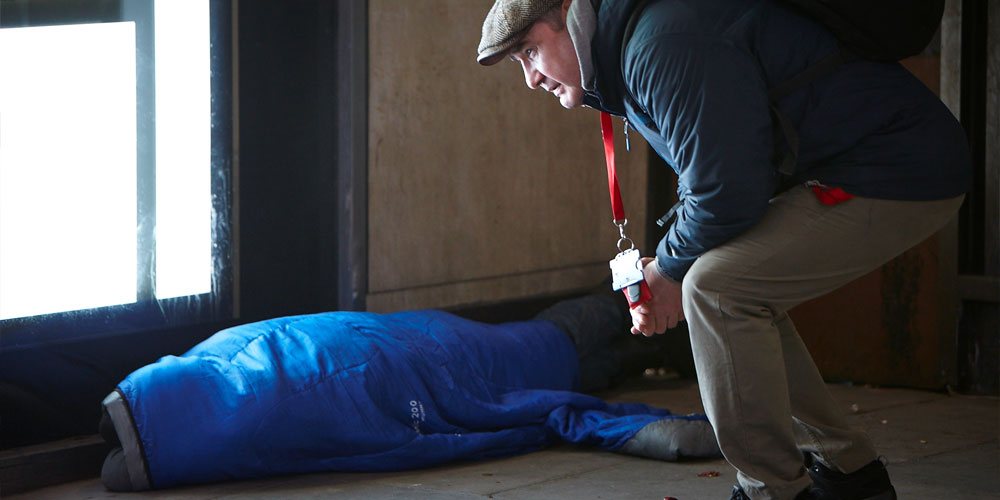The Compass Team, run by St Mungo’s, is a real partnership effort, comprised of staff from St Mungo’s and The Passage. Working with people who face many barriers to moving on from street homelessness, the team is a vital part of Westminster’s services. We asked Lindsay Rushforth, Service Manager of the team, and Angela Blair, a Compass Outreach Worker, to tell us more – and then checked in with their commissioner!
What is the Compass team?
Lindsay Rushforth (St Mungo’s): The Compass Team is a specialist outreach service. We are a team of eight and support about 100 people in Westminster. We work with people who have been on the streets for a long time and often have multiple and complex needs around mental and physical health, drugs, alcohol, learning disabilities and [immigration] status issues. The Compass Team is very person centred and there is an emphasis on through care i.e. we continue to work with clients when they are housed for as long as they need our support. Case workers manage their own time which allows them to be more flexible to the needs of their clients.
Angela Blair (The Passage): I have a background in generic outreach but Compass is more of a complex needs team, the main difference being that we have the time to work more closely and intensively with clients. Our work is very client centred, we take the lead from our clients. The people who we work with tend to need extra time and care. I work with about 15-20 people at any given time. We review the people we case work every six months so that we can take new people on but will only close cases when people are ready to move on from the support that we offer.
How does the partnership approach work?
Lindsay: The team is a mixture of staff from St Mungo’s and The Passage. People are seconded to the team from both organisations. St Mungo’s get the funding from Westminster and reimburses The Passage, who pay their own staff.
Angela: I work for The Passage and I think the coming together has worked really well. Everyone in the team has so much experience in the field. One colleague once worked out that we had about 150 years’ worth of experience between us! As a team we may have different ways of working but we all have a common goal. In this team I don’t particularly feel part of The Passage or St Mungo’s – I just feel part of Compass. I think this feeling starts with the manager who sets the tone and culture which seems to filter down through the team…. It’s a really supportive team.
What are the benefits of having the partnership?
Lindsay: The team has developed its own approach. We can access different resources from across the two organisations: day services, food stores, clothing stores, benefit advice services, access to an immigration lawyer. Overall there is more collaboration: for example, The Passage staff have access to Mungo’s training.
Angela: I wasn’t a stranger to many of the team when I joined so felt that the mutual respect was already there. In Compass we work closely together and seem to have an agreement and understanding about what we are doing. I find the whole team helps to make it work. There is mutual support and lots of helping each other out regardless of which organisation we work for. You have to be motivated to maintain momentum. But I think we are all spurred on by each other’s support and successes… Our managers know and trust us to form realistic and achievable support plans for our clients, and know that we’ll come to them if there is a problem or need advice.
How did COVID-19 change things?
Lindsay: We had to reorganise to create capacity. In March and April the Compass team worked alongside the Westminster SOS team to ensure support for the Everyone in initiative. It was all hands to the deck. The Compass team staff turned their hand to everything: street shifts, hotel shifts, food deliveries, whatever was needed at the time. As more people moved into the Covid-19 hotels the Compass team supported the case work. Our workload increased as we continued to case work our Compass clients both on the streets and in accommodation, whilst also case working individuals who were not Compass clients in the hotels. The new clients needed intensive attention to prepare them for move on into other more permanent accommodation. It was challenging as we felt like we had two hats on. Things have now settled a bit, and we are nearer to where we were.
The team is now mainly working with our own Compass clients again and 80% of these people are now indoors, which is amazing. Overall the pandemic encouraged us to work more closely with the SOS [Street Outreach Service] team in Westminster, which is a really good development and both teams are learning a lot from each other.
Angela: A lot more people are now indoors. The challenge now is to support and encourage people to remain in. If they have been on the streets for a long time and suddenly a council tax bill arrives, this can throw up a whole new batch of anxieties and problems. It is then that there is a real need for a wraparound support service and also a shift in how we can make this work.
======================
After hearing from the team, we touched base with their commissioner from Westminster City Council, Victoria Aseervatham who is a passionate advocate of the Compass team’s approach. She explained:
“The Compass Team is like a stick of psychologically informed rock – PIE [Psychologically Informed] through and through from every email, interaction, telephone call and case conference… always on their clients’ side, wondering and reflecting on how best to …help their clients build a life away from the street.”
